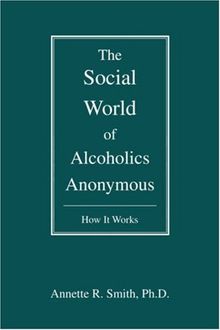
Using qualitative field study, including participant observation and
unstructured interviewing, this work focuses on Alcoholics Anonymous as
a social world. The social organization of A.A. is linked to social world
constructs, and aspects of A.A. social life, both formal and informal, are
described. It is suggested that success in A.A. is dependent on integration
into the social world, and that there are variations in the interactional
processes by which this is achieved.
Data is presented to illustrate that integration into the social world leads to
the A.A. conversion, a transformation of self-identity in which the
alcoholic accepts at the deepest level of being that he or she is alcoholic
and that recovery depends on the acceptance of A.A. values and practice
of A.A. principles. A typology of A.A. social world participants is
established which is informed by high or low levels of affiliative needs
and group dependency, group- versus individual-focused social world
participation, and affective versus cognitive conversion experiences.